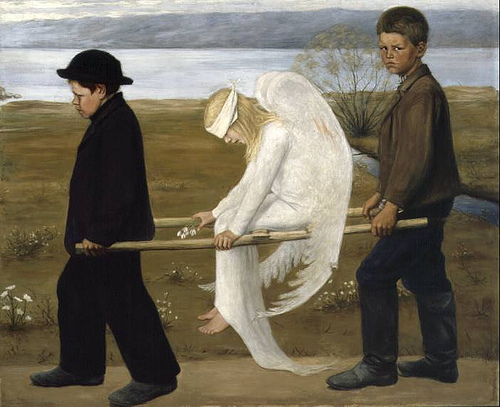
Finland’s national painting is Hugo Simberg’s The Wounded Angel.
Simberg refused to explain its meaning … but it was his favorite work.

Finland’s national painting is Hugo Simberg’s The Wounded Angel.
Simberg refused to explain its meaning … but it was his favorite work.
‘Did you hear the story of the extraordinary precocity of Mrs. Perkins’s baby that died last week?’ asked Mrs. Allgood. ‘It was only three months old, and lying at the point of death, when the grief-stricken mother asked the doctor if nothing could save it. “Absolutely nothing!” said the doctor. Then the infant looked up pitifully into its mother’s face and said—absolutely nothing!’
‘Impossible!’ insisted Mildred. ‘And only three months old!’
— Henry Ernest Dudeney, Amusements in Mathematics, 1917

James McNeill Whistler failed his West Point chemistry exam.
“If silicon had been a gas,” he said later, “I should have been a major general.”
In this sentence there are sixteen words, eighty-one letters, one hyphen, four commas, and one period.
A “decalogue of canons for observation in practical life,” sent by Thomas Jefferson to the new father of a baby boy:
It’s not clear what a smooth handle is. Possibly it refers to a saying by Epictetus: “Everything has two handles, one by which it can be borne, another by which it cannot.” Or possibly Jefferson was referring to the need for civil discourse.
See also Ben Franklin’s “13 virtues” and Poor Richard’s lesser-known maxims.

apodyopsis
n. the act of imagining a person naked
On the 4th of July 1803, a ball of fire struck the White Bull public-house, kept by John Hubbard, at East Norton. The chimney was thrown down by it, the roof in part torn off, the windows shattered to atoms, and the dairy, pantry, &c. converted into a heap of rubbish. It appeared like a luminous ball of considerable magnitude; and on coming in contact with the house, exploded with a great noise and a very oppressive sulphureous smell.
— Kirby’s Wonderful and Scientific Museum, 1803

On May 19, 1997, the U.S. National Oceanic and Atmospheric Administration detected an unprecedented sound in the eastern Pacific Ocean. Deep and vast, it descended in frequency over about 7 minutes. Here’s a sound file, sped up 16 times.
A few months later, and about 2,500 miles closer to Cape Horn, a Navy hydrophone picked up a mysterious “bloop.” This one matched the audio profile of a living creature; if so, it must have been gigantic, as the sound was audible more than 5,000 km away. Here’s a sound file of that one, similarly sped up.
No one knows whether the two are related; if something huge was headed for Chile, it never arrived. Neither sound has been heard since.

A proud mother once remarked that her baby looked exactly like Winston Churchill.
Churchill told her, “Madam, all babies look like me.”